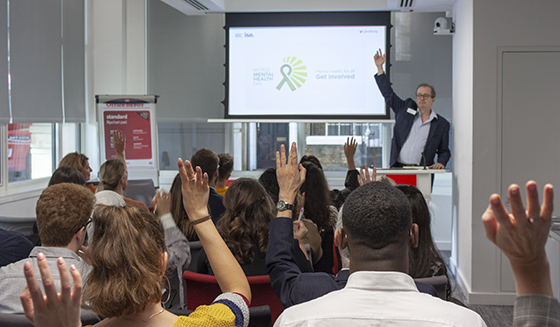ISE’s Marina Semencuka goes behind the scenes of our Apprentice and School Leaver Special Interest Group with an introduction to T Levels.
An overwhelming majority of ISE employer members (79%) are now running apprenticeship programmes, Inside student recruitment 2019 has found. As firms hire more apprentices (nearly 25% increase since last year), it is becoming more important for us to provide a platform where members can share the challenges and opportunities they face. Our Apprentice and School Leaver Special Interest Group offered a perfect opportunity to network and hear insights from a range of experts in early career recruitment.
Introducing T-levels
With the introduction of T Levels in September 2020, Bev Moxon from the National Apprenticeship Service explained the qualification in detail, including the difference between apprenticeships and T Levels and the benefits of industry placements to employers.
T Levels are new ‘level 3’ qualifications that will follow GCSEs and will be equivalent to three A Levels. Courses have been developed in collaboration with employers to ensure that they meet industry needs and prepare students for work.
Although both T Levels and apprenticeships are based on the same employer designed standards, they suit different learning styles.
While apprenticeships are paid work, suitable for students who know what occupation they want to pursue and wish to train ‘on the job’, T Levels are largely classroom based (80%) with a substantive industry placement (20%) of at least 45 days.
In addition, T Levels will offer broader course content and students have the opportunity to specialise later in their programme. Apprenticeships content is narrower and focused on a specific occupation from the outset.
Earlier this year the Education Secretary unveiled a new package of measures so employers can provide the heart of T Levels. This package of support is based on feedback from employers and further education providers and offers training, guidance and intensive support. Additionally, the Education and Skills Funding Agency announced an employer support fund in academic year 19/20.
To help prepare for the T Level rollout in September 2020, the government is looking for employers across all sectors to work with local training providers to offer industry placements now. You can find more information about the industry placements for T Levels and how employers can get involved on gov.uk. We will hear more from Bev about T Levels in the winter issue of The Student Employer.
Prioritising wellbeing
To mark World Mental Health Day, Simon Reichwald – ISE Board Director and Strategic Lead for Emerging Talent at MyKindaFuture – encouraged everyone to consider how we can support wellbeing at work.
A survey conducted by Hype Collective, in conjunction with ISE, found that most of the students who wouldn’t feel comfortable discussing their mental health with a potential employer feared that it would negatively affect their chances of being hired.
Many businesses are starting to recognise the importance of supporting mental health in the workplace. Nearly four-fifths (78%) of firms now have a mental wellbeing policy and 73% of respondents allocated a high priority to the mental wellbeing of their current staff, according to our Inside Student Recruitment 2019 report.
These are important steps taken by firms, and Simon’s call for employers to prioritise wellbeing resonated well among members as we progress further towards a stress-free transition from education to employment.
ISE runs Special Interest Groups on a range of themes for members to attend free of charge.


0 Comments